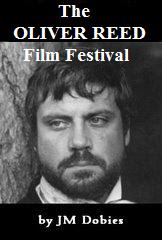
Z.P.G. a/k/a Zero Population Growth is one of those movies Oliver Reed made in Europe in the '70s, earning a nice paycheck, but not doing much for his body of work. Rather than go the US and rise to greater heights, Ollie chose to stay in England and farm himself out for projects like Z.P.G.
Director Michael Campus has had a strange career. He made five features between 1972 and 1976, including the blaxploitation classics The Mack and The Education of Sonny Carson, the speculative Biblical epic The Passover Plot, and Z.P.G., a dystopian science fiction film that was his debut. Campus recently directed his first film in over 30 years, the Straight-to-video, holiday-themed Thomas Kinkade's Home for Christmas, based on the early life of the self-proclaimed "Painter of Light," who pioneered mass production of cheesy landscapes.
Speaking of cheesiness, the special effects in Z.P.G. are definitely not your flashy Industrial Light and Magic/CGi-type FX. More like your '50s-era low-budget, visible strings on the spaceship-type stuff. The premise, however, is fairly serious. In a dystopian 21st Century, pollution and overpopulation threaten to destroy humanity, so the government outlaws childbirth for the next 30 years, under penalty of death.
As an alternative, couples can "adopt" creepy-looking robot children, but that option is not acceptable to Carol McNeil (Geraldine Chaplin), who, along with her husband Russ (Oliver Reed), works in a museum display of '70s Culture. It's a good gig, with plenty of space, extra oxygen rations, and a hydroponic vegetable garden, but it's not enough.
She wants a baby.
After having sex with her husband, she decides not to make use of the government-issued Abortron in the bathroom, and to keep the baby. And thus the conflict begins. She is forced to hide in the bowels of the museum, lest she be discovered and summarily executed. The method of choice is a floating plexi-glass gas chamber that can euthanize a family of three in under thirty seconds. There's also a bounty paid to anyone who alerts the authorities, which, with the lure of payment and a general "If I can't have one, neither can you" attitude, creates a scary mob mentality that threatens the couple at every turn. It's not just the authorities they have to watch out for, it's other people.
 While the special effects are not great (to say the least), luckily the polltuion is so thick that you can't really tell most of the time. It is the performances that stand out, especially Chaplin, who like her father Charlie, can convey a wide range of emotions without saying a word. Oliver Reed, looking fit in his early '70s prime as a leading man, doesn't have much to do in the first half of the film, but delivers the action in the latter half.
While the special effects are not great (to say the least), luckily the polltuion is so thick that you can't really tell most of the time. It is the performances that stand out, especially Chaplin, who like her father Charlie, can convey a wide range of emotions without saying a word. Oliver Reed, looking fit in his early '70s prime as a leading man, doesn't have much to do in the first half of the film, but delivers the action in the latter half.Good supporting performances by Don Gordon (Bullitt, Out of the Blue) and Diane Cilento (the real life ex-wife of Sean Connery) as the McNeil's co-workers, who discover the truth, and threaten them with exposure, unless they can co-parent.
Z.P.G. belongs to a sub-genre of dystopian sci-fi that also includes Soylent Green, Logan's Run, Zardoz, and the more recent Children of Men, and is definitely worth a rental, if only for Chaplin and Reed's performances.
The 2008 DVD release is strictly bare bones, lacking director commentary or even the original trailer.
A shorter version of this review was first published at Viewpoints.com, where you can read hundreds more of my write-ups, mostly film-related, as well as my reviews of books, local Austin places, various types of junk food, and some damn fine ales.




 Released on DVD by Anchor Bay Home Entertainment, but it has gone out of print, so shop around for a reasonable price.
Released on DVD by Anchor Bay Home Entertainment, but it has gone out of print, so shop around for a reasonable price.




